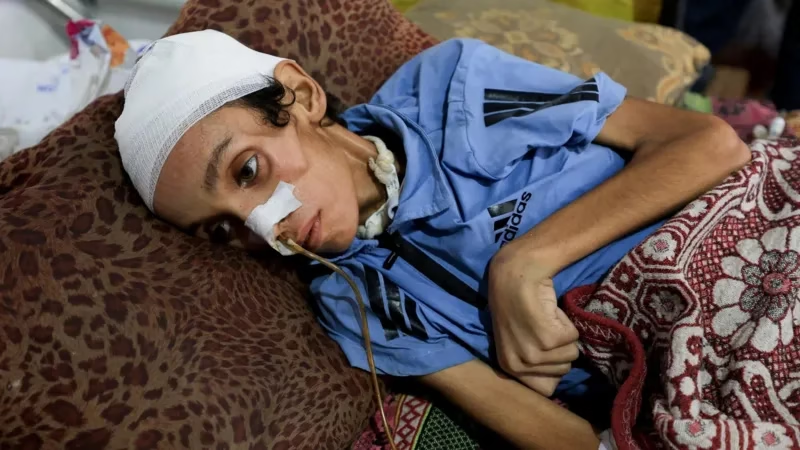The UN says almost 100,000 women and children are suffering from severe acute malnutrition in Gaza
July 23 — More than 100 international aid organisations and human rights groups are warning of mass starvation in Gaza and pressing for governments to take action.
Médecins Sans Frontières (MSF), Save the Children and Oxfam are among the signatories of a joint statement that says their colleagues and the people they serve are “wasting away”.
It calls for an immediate ceasefire, the opening of all border crossings, and the free flow of aid led by the UN.
Israel, which controls the entry of all supplies into Gaza, denies it is responsible for the increasingly severe food shortages.
It comes a day after the territory’s Hamas-run health ministry said 33 people, including 12 children, had died from the effects of malnutrition since Sunday.
The UN also reported that hospitals had admitted people in a state of severe exhaustion caused by a lack of food, and that others were said to be collapsing in the streets.
“As the Israeli government’s siege starves the people of Gaza, aid workers are now joining the same food lines, risking being shot just to feed their families,” the 109 humanitarian organisations say in the statement published on Wednesday.
“With supplies now totally depleted, humanitarian organisations are witnessing their own colleagues and partners waste away before their eyes.”
Israel imposed a total blockade of aid deliveries to Gaza at the start of March and resumed its military offensive against Hamas two weeks later, collapsing a two-month ceasefire. It said it wanted to put pressure on the armed group to release its remaining Israeli hostages.
Although the blockade was partially eased after almost two months, amid warnings of a looming famine from global experts, the shortages of food, medicine and fuel have worsened.
“Doctors report record rates of acute malnutrition, especially among children and older people. Illnesses like acute watery diarrhoea are spreading, markets are empty, waste is piling up, and adults are collapsing on the streets from hunger and dehydration,” the humanitarian organisations warn.
“An aid worker providing psychosocial support spoke of the devastating impact on children: ‘Children tell their parents they want to go to heaven, because at least heaven has food.'”
They also note that the UN human rights office says it has recorded the killing by the Israeli military of more than 1,050 Palestinians trying to get food since 27 May – the day after the controversial aid distribution mechanism run by the Israel- and US-backed Gaza Humanitarian Foundation (GHF) began operating as an alternative to the UN-led mechanism.
According to the UN, at least 766 people have been killed in the vicinity of the GHF’s four aid distribution sites, which are located inside Israeli military zones and operated by US private security contractors. Another 288 people have been killed near UN and other aid convoys.
The Israeli military says its troops deployed near the GHF sites have only fired warning shots and that they do not intentionally shoot civilians, while the GHF says the UN is using “false and misleading” figures from Gaza’s health ministry.
The humanitarian organisations also say that almost all of Gaza’s population has been displaced and is now confined to less than 12% of the territory not covered by Israeli evacuation orders or within Israeli militarised zones, making aid operations untenable.
And they say an average of only 28 lorry loads of aid is being distributed in Gaza each day.
“Just outside Gaza, in warehouses – and even within Gaza itself – tons of food, clean water, medical supplies, shelter items and fuel sit untouched with humanitarian organisations blocked from accessing or delivering them.”
The UN says Israel, as the occupying power, has an obligation under international law to ensure that humanitarian aid reaches all the population in need.
Israel insists it acts in accordance with international law and facilitates the entry of aid while ensuring it does not reach Hamas.
It has acknowledged recently that there has been a significant drop in supplies reaching Palestinians but blamed UN agencies.
Israeli military body Cogat, which co-ordinates the entry of aid into Gaza, wrote on X on Monday that almost 4,500 lorry loads had entered Gaza over the past two months, including 2,500 tonnes of baby food and high-calorie special food for children.
It also published drone footage showing what it said was some of the 950 lorry loads of aid waiting to be collected by the UN and other international organisations on the Gazan side of the Kerem Shalom and Zikim crossings.
“The collection bottleneck remains the main obstacle to maintaining a consistent flow of humanitarian aid into the Gaza Strip,” Cogat said.
The UN has said it struggles to collect aid from inside the crossing points and transport it through military zones because of the ongoing hostilities, fuel shortages and difficulties in getting Israeli authorisation.
According to the UN humanitarian office, between 9 and 15 July, out of 66 attempts to co-ordinate planned aid movements across Gaza, almost 17% were denied by Israeli authorities.
An additional 33% were initially accepted but faced impediments, including blocks or delays on the ground, and 5% had to be withdrawn for logistical, operational or security reasons.
The humanitarian organisations say they “cannot continue to hope that current arrangements will work” that it is time for governments to “take decisive action”.
“Demand an immediate and permanent ceasefire; lift all bureaucratic and administrative restrictions; open all land crossings; ensure access to everyone in all of Gaza; reject military-controlled distribution models; restore a principled, UN-led humanitarian response and continue to fund principled and impartial humanitarian organisations.”
“States must pursue concrete measures to end the siege, such as halting the transfer of weapons and ammunition,” they add.
On Monday, the foreign ministers of the UK and 27 other countries called for an immediate end to the war in Gaza. Israel’s foreign ministry said the statement was “disconnected from reality and sends the wrong message to Hamas”.
The Israeli military launched a campaign in Gaza in response to the Hamas-led attack on southern Israel on 7 October 2023, in which about 1,200 people were killed and 251 others were taken hostage.
At least 59,106 people have been killed in Gaza since then, according to the territory’s Hamas-run health ministry.



